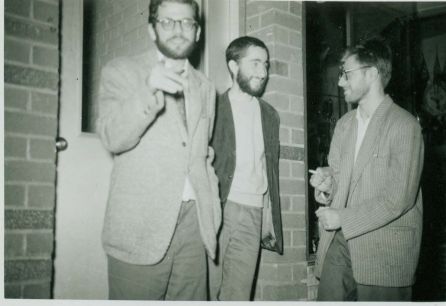 |
| Ginsberg points at the Sir Francis Drake Hotel, the inspiration for Moloch in "Howl," San Francisco, 1959. |
On Tuesday, we'll continue to look at poetry from one of Ginsberg's most prolific and groundbreaking periods: the time between the composition of "Howl" in the mid-1950s and the publication of Kaddish and Other Poems in 1961. Had the young poet never written another line, he'd have still produced more than enough to earn his reputation as one of the 20th century's most innovative poets. It's worth noting that these poems were scattered over a number of later volumes, however Collected Poems returns them to a strict chronological order, and in doing so, Ginsberg's stylistic development is made clearer.
This period is also one of great personal change for Ginsberg. Aside from losing his mother, Naomi (which we'll discuss in greater depth on Thursday with "Kaddish") in 1956, he also spends a great deal of time outside the country — first in Mexico (as detailed in Kerouac's Desolation Angels) and then joining William Burroughs in Morocco (where he helped transcribe and edit the manuscript of Naked Lunch) before an extended period of travel throughout Europe. The publication of Howl and Other Poems and its subsequent obscenity trial, combined with spotlight placed on Kerouac and On the Road transformed the Beats from a subterranean group of close friends to an international phenomenon, and each struggled with it in different ways (Ginsberg, for example, felt terribly conflicted about receiving money for readings, considering it a prostitution of his talents, and suffered writers block). Ginsberg also entered into what would be a life-long relationship (albeit an often-tumultuous one) with Peter Orlovsky, coming to terms with his homosexuality after several years of ambivalence and experimentation with women (you'll recall that in The Subterraneans — as well as in The Dharma Bums — Ginsberg's alter-egos are depicted as straight) and this spirit of acceptance would soon make its way into his writing. This activism also carries over into questions of public obscenity and censorship, with the poet organizing several benefit readings around the issue of a suppressed issue of the Chicago Review (containing work by several Beats, most notably a visceral excerpt from Naked Lunch), which would eventually be published as the first issue of Big Table. Finally, in 1959, Ginsberg tries LSD for the first time, and while he was no stranger to drug experimentation, psychedelics would greatly shape both his aesthetic and cultural priorities in the coming years.
 |
| Ginsberg, Irving Rosenthal, and Peter Orlovsky at a Big Table benefit reading in 1959 (listen to audio here). |
Also, since Thursday's conversation (and presentation) was concerned with "Howl," there are a number of worthwhile poems in that day's reading that shouldn't get lost in the shuffle ("A Supermarket in California," "Sunflower Sutra" and "America" jump immediately to mind), so we can spend some time looking at one or two of them if we haven't already covered them.
Here are our readings, with PennSound audio when available:
- Transcription of Organ Music (148): MP3
- Sather Gate Illumination (150)
- Tears (159): MP3
- In the Baggage Room at Greyhound (161): MP3
- Ready to Roll (167)
- Wrote This Last Night (174): MP3
- Death to Van Gogh's Ear (175): MP3
- The Lion for Real (182): MP3
- American Change (194)
- Back in Times Square, Dreaming of Times Square (196)
- My Sad Self (209): MP3
- Psalm IV (246)
No comments:
Post a Comment